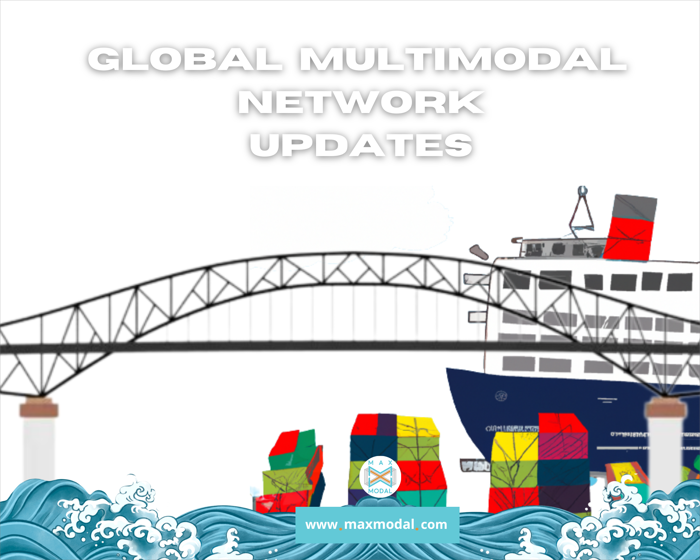The multimodal network news digest - issue #44
Panama's unlucky season
Transpacific rates are increasing as carriers face restrictions at the Panama Canal. Due to maintenance work and reduced transit slots at the canal, they are encountering delays and congestion, which is leading to higher costs and tighter capacity. Ocean carriers will have to consider downsizing vessels deployed on the Asia-US east coast Panama Canal loops. One of the options could be to route more Asia-USEC strings via the Suez Canal but it is rather expensive.
Workers at the Pacific ports of Vancouver, Prince Rupert, and Stewart in Canada have voted in favor of striking, raising concerns for beneficial cargo owners. The strike vote comes after negotiations between the International Longshore and Warehouse Union and the British Columbia Maritime Employers Association reached an impasse. The main points of contention include worker wages, working conditions, and automation concerns. At the same time with the looming strike, transpacific container volumes have been increasing raising concerns about potential disruptions in the supply chain. In addition, the strikes on the US West Coast are influencing shipping operations by disrupting schedule reliability. The strikes have also impacted trucking services, further exacerbating logistical issues.
The changing market dynamics are making carriers divert their services from problematic routes to more profitable and stable ones. In particular, most of the top ten carriers have reduced their fleets trading between Asia and North America.
Latin American trade had overtaken Asia-Europe. Africa and the Middle East are also among the potential prospects. Overall, with all the challenges that have been going on, carriers' profits dropped by 81%, to $7 billion. The trend for declining revenues started in 2022 and fully unfolded in the Q1 of 2023.
Routes, rates & services
- CPKC, a Kansas City-based intermodal company, aims to attract Asian shippers by offering rail freight coverage under the USMCA (United States-Mexico-Canada Agreement). CPKC has access to seven gateways for ocean traffic: Vancouver, Montreal and St John in Canada; New Orleans in the US; and Lázaro Cárdenas, Veracruz and Altamira in Mexico.
- In North Europe, freight rates continue to decline ($1,195 per 40ft), while in the Transpacific, rates are experiencing a significant spike (by 11.5%, to $2,619 per 40ft). The high demand for goods from Asia, especially from China, has resulted in limited container availability and a shortage of vessels.
- Mexico tries to attract investors to the Tehuantepec trade project by offering incentives. The government plans to establish a special economic zone in the region, offering additional benefits such as tariff exemptions and preferential regulations for businesses operating within the zone.
- Union Pacific expands its intermodal service at Port Houston to meet the growing demand for intermodal transportation and improve the efficiency of cargo movement between Port Houston and major markets across the US.
- Canadian Pacific and Kansas City Southern expand their Mexico intermodal reefer rail service by adding new temperature-controlled reefer terminals.
- Carriers are refraining from implementing surcharges in the Indian market due to its soft conditions. In the current context, the levy of $800 per teu, $1,000 per feu and $1,200 for hi-cube loads (including reefers) will start on 1 July.
- Hapag Lloyd has added the port of Manzanillo in Panama to the port rotation of the West Coast South America Express (MSW) service.
- Iran has inaugurated a new railway line connecting Bostanabad to Khavaran. This railway line is part of a larger project aimed at developing Iran's rail network and improving connectivity both domestically and internationally.
- The first railway operation between Iran and Afghanistan has been successfully completed. The railway line is part of a larger project known as the Khaf-Herat railway.
- CMA CGM has launched a new rail service on the Mediterranean Corridor linking the port of Valencia with Murcia, in southeastern Spain.
- Experts acknowledge the ongoing competition between Russia and the EU to establish close cooperation with Kazakhstan, a key player in the New Silk Road initiative. Russia has been historically closely aligned with Kazakhstan. The EU, on the other hand, has been actively engaging with Kazakhstan, seeking to deepen its economic and political relations with the country.
- Mawani, the Saudi Ports Authority, has introduced a new shipping service to Jeddah Islamic Port operated by Omani International Logistics Group.
- Maersk, Renfe, and Cepsa have successfully conducted the first test of second-generation (2G) bio-fuel in Spanish rail transport as part of efforts to reduce carbon emissions and promote sustainable transportation.
- DP World has introduced a new rail incentive program to promote the use of rail transportation for containerized cargo. The Modal Shift program will charge a flat $12.41 fee on all import-laden containers. Customers whose container is moved to a railhead more than 140 miles from the terminal are reimbursed and a $86.90 incentive is paid to those whose container is moved to a railhead within 140 miles of the terminal.
- CMA CGM introduced a new rail solution in Spain connecting Valencia with Murcia in Spain.
Other
- Maersk has been fined $9.8 million by the Federal Maritime Commission for violating the Shipping Act. The fine was imposed due to allegations that Maersk engaged in unfair practices by providing misleading information to the FMC during an investigation into alleged excessive detention and demurrage charges.
These are only several changes that occurred in more than 250 bn freight rates across 25 million routes with more than 1 million market players. Want to share some news about your company, services, and routes? Just post them on MAXMODAL, a multimodal network that digitally connects routes and rates worldwide to automate sales and operations across container transportation & logistics industry. Join to innovate.

